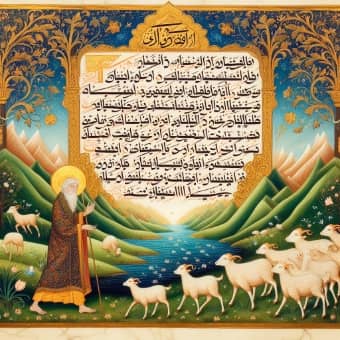An In-depth Look at Psalm 23
Drawing Strength from the Shepherd
Psalm 23, penned by David, is one of the most cherished passages in the Bible, offering comfort and reassurance in times of need. This Psalm serves as a gentle reminder that God, our Shepherd, provides us with all that we need, guides us, protects us, and is with us through all the trials and tribulations of life.
Let’s take a detailed look at each verse and glean the profound meanings and assurance each one holds.
This blog post contains affiliate links. When you click on a link on this page and make a purchase I may earn a small commission, at no additional cost to you. Thank you for your support.
Verse 1: “The Lord is my shepherd; I shall not want.”
This opening line sets a tone of complete dependence and trust in God. David uses the metaphor of a shepherd, which is familiar and deeply resonant for the agrarian society of his time, emphasizing the role of God as a provider and protector.
The assertion “I shall not want” indicates that with the Lord as our shepherd, we lack nothing essential. He ensures that all of our needs are met.

Verse 2: “He maketh me to lie down in green pastures: he leadeth me beside the still waters.”
Here, the imagery of green pastures and still waters portray peace and restfulness. In ancient Near Eastern culture, a shepherd’s primary duty was to find food and water for the flock, which isn’t always easy in arid climates.
This verse promises that with God as our Shepherd, He will guide us to a place of sustenance and rest. It reflects His ability to provide environments that nourish our souls and give us respite.
Verse 3: “He restoreth my soul: He leadeth me in the paths of righteousness for his name’s sake.”
God’s guidance is holistic – He cares for our emotional well-being, restoring our weary souls. By leading us in paths of righteousness, He isn’t simply watching over our physical needs but also our moral and spiritual growth. The phrase “for his name’s sake” reflects God’s commitment to uphold His holy character and promises, demonstrating His unchanging nature.
Verse 4: “Yea, though I walk through the valley of the shadow of death, I will fear no evil: for thou art with me; thy rod and thy staff they comfort me.”
Arguably the most powerful verse of this Psalm, David speaks of walking through the darkest and most fearful experiences (metaphorically described as the “valley of the shadow of death”) with confidence.
He fears no evil because the Lord is present with him. The “rod” and “staff” are tools used by shepherds to guide and protect their sheep, symbolizing God’s protection and guidance.
Verse 5: “Thou preparest a table before me in the presence of mine enemies: thou anointest my head with oil; my cup runneth over.”
Even amidst adversity, God provides abundantly. The “table” is a metaphor for sustenance and abundance. Anointing the head with oil is a sign of being chosen and blessed, often used in ceremonies for kings and priests. David feels not just cared for, but honored and cherished. The overflowing cup signifies abundant blessings beyond basic needs.
Verse 6: “Surely goodness and mercy shall follow me all the days of my life: and I will dwell in the house of the Lord for ever.”
The Psalm concludes on a profoundly optimistic note. David expresses his trust in God’s enduring goodness and mercy. The phrase “follow me” suggests a relentless pursuit—God’s kindness and grace are like a divine safety net throughout his lifetime. Choosing to dwell in the “house of the Lord forever” reflects a deep, lasting commitment to remain in God’s presence.
In embracing Psalm 23, we find not just poetic comfort, but a profound assurance that God, our Shepherd, is ever-present and active in our lives. This Psalm encapsulates the experience of God’s deep care, guidance, and the security He provides, encouraging us to trust Him in every circumstance.
